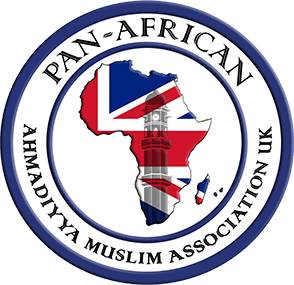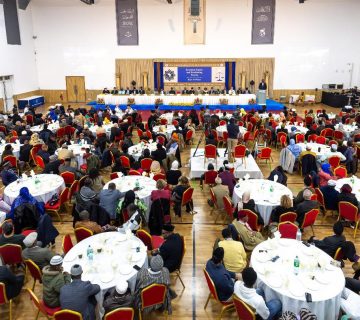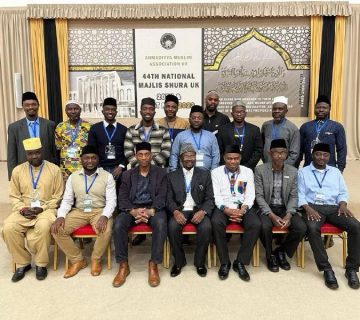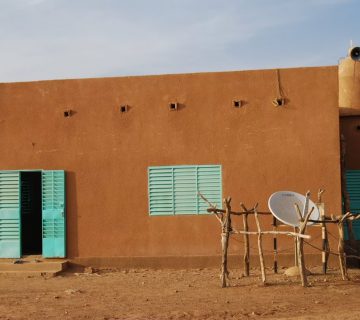The Achievements of Hadhrat Musleh Maud (ra)
Speech by PAAMA President Tommy Kallon
at the London Region Musleh Maud Day Commemoration
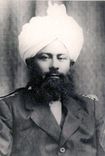
“Rejoice, therefore, that a handsome and pure boy will be bestowed on thee… He has been invested with a holy spirit, and he will be free from all impurity… He will be characterised by grandeur, greatness and wealth. He will come into the world and will heal many of their ills through his Messianic qualities… He will be extremely intelligent and understanding and will be meek of heart and will be filled with secular and spiritual knowledge… He will grow rapidly in stature… His fame will spread to the ends of the earth and people will be blessed through him. He will then be raised to a spiritual station in heaven. This is a matter decreed.”
Respected Chairman, dear sisters, dear brothers!
Assalamu Alaikum wa Rahmatullahi wa Barakatuhu.
These are a few words from a glorious prophecy revealed to the Promised Messiah (as). He had been in retreat for 40 days devoting himself entirely in solitude to Divine worship and supplication after which he announced that he had been honoured with revelation containing the prophecy of the birth of an extraordinarily pious and righteous son as the Promised Reformer.
Today we celebrate the accomplishments of Hadhrat Mirza Bashiruddin Mahmood Ahmad (ra), whose whole life and achievements during two and fifty years as Khalifatul Masih II constitute a fulfilment of this grand prophecy. Commentators were later to describe this prophecy as the single most outstanding sign ever given to man with the exception of the events that occurred during the life of the Holy Prophet (saw). The prophecy is studded with innumerable contingencies the non-fulfilment of a single one of which would have demonstrated its falsehood. A son had to be born; that son was to attain a lofty spiritual station; he was to be filled with knowledge both religious and secular; he was to grow rapidly in stature; and his fame was to spread to the ends of the earth. From whatever vantage point one views this prophecy, the impossibility of it being the product of human imagination becomes patent. The astonishing record of high achievement in many fields of human endeavour mark Hadhrat Khalifatul II (ra) out as a shining figure in the annals of Islam and establish the truth of this prophecy. Most importantly, the glorious fulfilment of this prophecy leaves no room for doubting its Divine origin. It affirms the existence of God, the glory of the Holy Prophet (saw) and the truth of the Promised Messiah (as).
Even in the early stages of his life, the grand Divine design is retrospectively perceptible that Hadhrat Mirza Bashirruddin Mahmood Ahmad (ra) was singled out for a lofty spiritual station. At the youthful age of 17, he organised a literary association of his friends under the name Tashheezul Azhan. He started a quarterly magazine under the same name devoted to the exposition of spiritual values. Similarly, very early on, he developed a keen interest in the study of the Holy Quran and Traditions of the Holy Prophet (saw). He had the inestimable privilege of having being instructed in these matters by Hadhrat Khalifatul Masih I (ra) who, rather than spoon-feed him, encouraged him to think for himself and to develop his God-given faculties in the most beneficent manner.
Then when he was only 19, tragedy struck and he lost his revered father, the Promised Messiah (as). Here again, Hadhrat Musleh Maud (ra), the Promised Reformer, as he was later designated, came into his own. He understood the true import of his father’s demise. So much had been accomplished during his lifetime, yet so much more had to be done. Standing by the blessed corpse of his father, he made that famous and moving pledge that even if the whole world deserted him, he would continue single-handed in this noble work.
This was not just an emotional claim made in a moment of grief. History bears unanimous testimony to the sincerity of his pledge. Let it not be forgotten that he was elected to the exalted office of Khalifatul Masih at the tender age of 25. He was immediately confronted with a series of extremely difficult situations. The Jama’at was still relatively small in number and its financial resources were bare. Moreover, a dissident faction arose who challenged his authority and chose to break away from the Jama’at threatening to take away the majority of members with them. In their eyes, he was utterly unsuitable to discharge the enormous responsibility of that high office. But his record demonstrates how mistaken they were in their estimation. The quality of his leadership and the quality of character he imparted into the Jama’at enabled it to progress in leaps and bounds. The period of his leadership, characterised by landmarks and milestones, became a glorious period in the history of the Jama’at.
He knew exactly when to launch challenging schemes or to restructure the Jama’at’s activities in significant ways. One of the first things he did as Khalifatul Masih was to establish the consultative body known as Majlis-e-Shura. This was to become a permanent institution within the Jama’at that meets annually or as is necessary to deliberate and advice the Khalifa of the time on important policy matters.
The dynamism of his leadership which continuously stimulated the Jama’at called for additional departments, organs and institutions to be established to streamline into an effective and practical mould, the administrative machinery of the Jama’at. Most notable among these are the auxiliary associations he set up for the purpose of proper training and advancement towards the achievement of the noble aims and objectives of the Jama’at.
His unique genius is still evident today. Every section of the Jama’at is organised into an association – Lajna Imaillah for the ladies, Majlis Khuddamul Ahmadiyya for the youth, Majlis Ansarullah for the elders and also Majlis Atfalul Ahmadiyya and Nasiratul Ahmadiyya for younger boys and girls. These bodies are now flourishing in thousands across the world and have continued to train and develop leaders for the various Jama’ats. All members, under the auspices of their particular association are bound together in affectionate ties of brotherhood and sisterhood, and carry out programs designed to inculcate moral and spiritual values.
From the beginning, Hadhrat Musleh Maud (ra) was keen on promoting literacy and education in all sections of the Jama’at. Particularly, he paid special attention to the education of women. As a result of the methods he adopted for the achievement of his purpose, the average standard of education among women in the Jama’at is today considerably higher than that of sister communities in South Asia and Africa. The Madrassah Ahmadiyya which had been established for religious instruction was raised by him to the status of Jamia Ahmadiyya, an elite institution designed to train scholars to serve as missionaries of Islam in different parts of the world.
Hadhrat Musleh Maud (ra) also took the lead in matters which, though not at the centre of religion, were not outside its scope. His definition of religion comprehended everything that bore immediately or ultimately on the welfare of society. In giving practical effect to that definition, he strove to finds means that would protect the Jama’at, in every respect, from discord and disharmony. It was this yearning that led him to establish the Qadha Board, a judicial system, providing the Jama’at with a very fair, economical and dignified way for its members to settle internal disputes, in accordance with Islamic law and jurisprudence. He also instituted the Electoral College for the election of Khalifas to save the Jama’at from the threat of crisis should that sacred office become vacant. Due to his wisdom and sagacity subsequent elections of Khulafa have run with no hindrance.
In 1924, he was requested to attend and participate in the Wembley Conference of World Religions as the representative of Islam. His arrival in London was widely publicised in the press. The English rendering of his address was listened to with absolute silence and when it was done, there was a deep sigh as if the audience had been released from a spell. About this the Manchester Guardian wrote:
“The sensation of the conference so far was the appearance this afternoon of a new sect of Islam, which claims to have been founded 34 years ago by the Messiah of Biblical and other prophecy and to have an express divine command to lead mankind to God through Islam… his Holiness Khalifa-tul Masih presented this bold claim in a paper entitled ‘The Ahmadiyya Movement in Islam’… The paper, it must be added, was followed with much more applause than any of its predecessors.”
It was while he was in London that Hadhrat Musleh Maud (ra) laid the foundation stone of the Masjid Fazl that today stands in resplendent glory having been the home of the Khalifa of the time for the last 32 years.
Hadhrat Musleh Maud (ra), though not a politician, was granted a deep understanding and insight into political affairs. In 1930, the dispute over Kashmir was threatening to degenerate into a crisis. He became involved upon the repeated requests of the respectable Muslim leaders of India and, to the delight of all, he was elected to lead the All-India Kashmir Committee as its first President. He worked arduously to secure the basic human rights of the oppressed people of Kashmir and the first ever Kashmir Day was celebrated under his guidance. After the partition of the Indian subcontinent, he raised a battalion of Ahmadi Muslim volunteers named the Furqan Force to fight alongside the Pakistani Army for the liberation of Kashmir. There were many successes and fine examples of bravery among the Ahmadi fighters openly acknowledged by the then Commander-in-Chief.
To facilitate the propagation of the message of Islam in countries outside the Indian Subcontinent, Hadhrat Musleh Maud (ra) launched the Tehrik-e-Jadid scheme. Through the instrumentality of this scheme, there is hardly a country of the world today where the Jama’at is not established. Thousands of mosques, mission houses, clinics, hospitals, schools and colleges dedicated to the service of Islam have been established around the globe. He followed this with the Waqf-e-Jadid scheme with emphasis on intensifying Islamic activities in the rural areas of the Indo-Pakistan subcontinent.
Hadhrat Musleh Maud (ra) possessed a great versatility of mind and his intellect was unmatched among his contemporaries. These qualities were strikingly illustrated in his many speeches and writings. Together they constitute a most precious treasury representing the multiple facets of Islam in scintillating and attractive colours.
His speeches were intellectual banquets at which those present were regaled to their delight. In that guise, he stimulated their intellects, enlivened their faculties, incited them to climb moral and spiritual heights and sent them home greatly enriched and determined to carry out a spiritual revolution both inside themselves and in the world around them. Everyone marvelled at the skill that enabled him to put forth the profoundest moral and spiritual verities in a language and style which were easily comprehensible by the average listener. He did not strike a pose and took no flights into the intellectual stratosphere. His purpose was to stimulate rather than to overawe. His audience felt at home with him. No one experienced any fatigue and at the end the feeling was not relief but regret it could not go on any longer.
His books and pamphlets which number more than two hundred expose him as an eminent divine, a discerning mystic and an expert diagnostician of eternal verities. He combined a vast expanse of erudition with a formidable intellect tempered by a wide scholarship which comprehended every type of literature from divine scriptures to secular masterpieces. The existence of God and the nature of His attributes, angels and their function, prayer and its efficacy, Divine decrees and their domain, worship and its need, Divine law and its benefits, revelation and its importance, life after death and its certainty, heaven and hell and their reality – with regard to every one of these, Hadhrat Musleh Maud (ra) was able to analyse, discuss and explain in readily comprehensible language.
The Tafseer-e-Sagheer, a brief commentary he wrote on the Holy Qur’an is didactic without being pedantic. But the fathomless ocean of his knowledge is revealed in his magnum opus, the Tasfeer-e-Kabeer, an exhaustive commentary on the Holy Qur’an. In this astounding work, Hadhrat Musleh Maud (ra) uncovered his mastery on such widely varying fields as history, philosophy, psychology, geology, physics, chemistry, biology, sociology, politics, linguistics, medicine, botany, embryology, cosmology, astronomy, Egyptology and many more. But, above all, this ten thousand-page commentary on the Holy Qur’an contains a deep esoteric understanding and exposition of thousands of spiritual truths and hidden secrets, many of which had never been presented before.
Hadhrat Musleh Maud (ra) also showed an acute understanding of complex social issues, successfully guiding the Jama’at through two world wars and a migration en masse to Pakistan after the 1947 partition of the Indian subcontinent, at the same time preserving the morality and welfare of the Jama’at and disseminating its message to faraway lands. This mass migration to Pakistan from where he started the whole city of Rabwah from absolute scratch in a most inhospitable land was nothing short of miraculous. The enormous problem of rehabilitation, resettlement and reorganisation was a backbreaking task in itself. But Hadhrat Musleh Maud (ra) also suffered great anxiety over the volunteers that stayed behind to protect the holy precincts of Qadian who were surrounded by hostile forces while at the same time bereft, momentarily, of spiritual leadership. That, perhaps, was his greatest test as a leader and one in which his high and sterling qualities presaged in glowing terms by Allah Himself in the prophecy came to the fore.
Dear sisters and brothers! This was but a brief summary of the major achievements of Hadhrat Musleh Maud (ra). A detailed exposition would run into volumes and is beyond the scope of this address but just to give some indication, Hadhrat Musleh Maud (ra) is credited with the launch of the Al Fazl newspaper that has today become the official organ of the Jama’at. He credited with the completion of the Minaret-ul-Masih in Qadian. He is credited with the re-establishment of the Talimul Islam College that had been closed due to limited resources. Though a tragedy of epic proportions that Ahmadi Muslims in Pakistan are subjected to utmost cruelty and persecution, it was in fact Hadhrat Musleh Maud (ra) who sent messages through Hadhrat Abdur Raheem Dard Sahib, then Imam of the London Mosque, to Muhammad Ali Jinnah to convince him to return from London back to India and to strive for the creation of Pakistan, an independent state for the Muslims of a then all-inclusive Indian State.
Hadhrat Musleh Maud also launched the Waqf-e-Zindagi scheme for dedicating one’s life to the service of Islam and in this regard he enjoyed the enviable position of having been blessed with 13 sons, all of whom devoted their lives to the service of Islam. He initiated the annual observance of Jalsa Seerat-un-Nabi which are public meetings convened to present to the world the life and character of the Holy Prophet (saw) in true colours. He instituted Religious Founders’ Day, a natural and necessary sequel to Jalsa Seerat-un-Nabi to celebrate the lives of the founders of all great religions. These have been instrumental in promoting interfaith understanding and appreciation.
His Khilafat truly represents a golden age in the history of Ahmadiyyat and of Islam. During his tenure of office, he was continually preoccupied with problems of variety and volume calling for the exercise of the highest qualities of astonishing diversity, and on no occasion was he found wanting. In spite of manifold duties and multifarious engagements, he strove hard to maintain the Jama’at at the highest level of activity, both in respect of self-improvement and in respect of propagating the message of Islam. For this purpose, he called in aid all his great talents; he had recourse to continuous advice, exhortation and admonition; he set a high and shining personal example and spent a good part of his nights in earnest supplication to the Divine.
To the members of the Jama’at he was, at all times, a deeply loving father to whom they could look up to for guidance, advice and encouragement; to all intelligent and reasonable people of goodwill he proved himself a wise friend and counsellor; towards his opponents he was forbearing and truly sympathetic over their lack of understanding and to the afflicted he was, without discrimination, a ready source of comfort, consolation and cheer.
Little wonder then that the news of his demise in 1965 was received with intense grief. Tributes in superlative terms were paid to him from all quarters. The view taken by the Editor of The Light, a weekly publication of the dissident Lahori group, though not the only one of its kind, is too striking to be omitted here. Under the caption, A Great Nation-Builder, he writes:
“The death of Mirza Basheer-ud-Deen Mahmood Ahmad, Head of the Ahmadiyya Movement, rang the curtain down on a most eventful career, packed with a multitude of far-reaching enterprises. A man of versatile genius and dynamic personality, there was hardly any sphere of contemporary thought and life during the past century, from religious scholarship to missionary organisation, even political leadership, on which the deceased did not leave a deep imprint. A whole network of Islamic missions and mosques scattered over the world, the deep penetration of Islamic preaching in Africa, transplanting the long-entrenched Christian Missions, are a standing monument to the imaginative planning, organisational capacity and unflagging drive of the deceased. There has hardly been a leader of men in recent times who commanded such deep devotion from his followers, not only when alive, but also after death, when sixty thousand people rushed from all parts of the country to pay their last homage to their departed leader. In the story of the Ahmadiyya Movement the Mirza Sahib’s name will go down as a Great Nation Builder, who built up a well-knit community in the face of heavy odds, making it a force to be counted with. We offer the bereaved family our deep condolences in their great loss.”
This, my dear sisters and brothers, was Hadhrat Musleh Maud (ra). In the role Divine wisdom imposed upon him, he acquitted himself with distinction and excellence. Humankind would forever be indebted to him for his unique and invaluable services to Islam and Ahmadiyyat. May Allah join him in the company of his holy father, the Promised Messiah (as) and the Holy Prophet (saw), whose love filled his heart and coursed his veins. Ameen.
Respected Chairman, I would be remiss in my duty here today if, in the end, I fail to point out that all this remembrance would be futile if we do not seek to emulate Hadhrat Musleh Maud (ra). While, as Ahmadi Muslims, we take just pride in his achievements, this is not and should not be an occasion for pomp or circumstance. On the contrary, as repeated directed by our Beloved Huzur, we should strive to follow in his footsteps so that we may benefit alike from his precept and his example and become Musliheen (Reformers) in our respective spheres.
Let me therefore leave you with the pertinent advice of one of the sons of Hadhrat Musleh Maud (ra), himself a distinguished servant of Islam. On the occasion of the centenary celebration of the announcement of the grand prophecy in 1996, this is what he said. This is what Hadhrat Khalifatul Masih IV (ru) said:
“So let us enter the new Century with the determination that we would respond to the call of Musleh Maud (ra), every moment of whose life saw the fulfilment of that prophecy. If you respond to that call, you will live the age of Hadhrat Musleh Maud (ra). If you live the age of Hadhrat Musleh Maud (ra), you will live the age of the Promised Messiah, the greatest lover of the Holy Prophet, peace be upon him. And if you live the age of the Promised Messiah, you are assured by the Holy Quran that you will live the age of the Holy Prophet, peace be upon him.”
May Allah so ordain and bless you all profoundly. Ameen.
Chairman, sisters, brothers! Thanks for having me. Wassalamu Alaikum.
